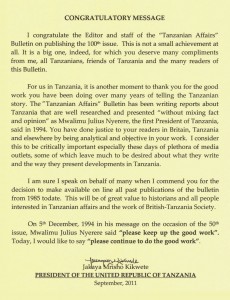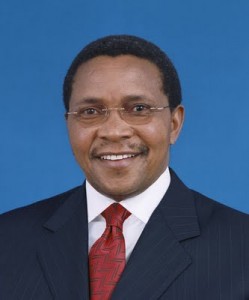Archdeacon Capper
I was surfing the net looking for anything relating to Archdeacon Edmund Capper of Lindi. I found your Tanzanian Affairs Issue 61 with some notes regarding the obituary of the Archdeacon and a reference to his appointment to Lindi.
On 27 March 1950 I was married by Archdeacon Capper in the temporary bamboo and makuti St Michaels Anglican Church in Mtwara. At that time permanent buildings were not permitted in advance of town planning. Archdeacon Capper visited St Michaels fairly regularly to perform services. I was the first to be married in the church and was followed later by two other members of our staff, Michael MacKie and Benjamin Kelly. We were members of a construction team building the port works of Mtwara, initially for the Overseas Food Corporation, ground nut scheme and when that folded the work was completed on behalf of East African Railways and Harbours. Our accommodation consisted of a series of one man bandas with bungalows for married staff along the shore line at Shangani which I believe is now a prime residential area. It was certainly very pleasant for us, with the tide right for an early morning dip before work.
I hope these brief notes are of interest to you and I would be pleased to hear any reactions.
Thomas Scott (e-mail editor for contact info)
Radio Congo
Simon Hardwick’s review of Radio Congo by Ben Rawlence introduced the book and its author very nicely. However, having read the book myself, I felt the review overlooked the most fascinating aspect – Rawlence’s determination to get past the single-story narrative that dominates most writing and international media coverage of the Great Lakes region.
For a western audience, the usual story goes no further than painting a muddy picture of war, rape and brutality in the jungle, fuelled by mineral wealth. Other travel writers focus on the inhospitable terrain, the lack of modern amenities and the hardships facing the western traveller. Rawlence, to his credit, avoids dwelling on either the challenges to travellers or the politics of warlords, focussing instead on the lives of “ordinary” people getting on with life. Yes, they live under the shadow of violence, but they’re struggling on, and Rawlence tells their stories with a rare dignity and respect.
Stephen Jones
Embellishment?
Re the obituary in TA 104 of Cameron Whalley. It is hard to believe that someone born in 1937 “joined a team of geologists employed by… Williamson, who was challenging the De Beers monopoly…(and)…later established the Mwadui Mine.” Mwadui was founded in 1940, which would make Whalley a very precocious young geologist. Williamson died in 1958, when Whalley was 21, if the date of birth is correct. The Telegraph obit also suggests he became a game warden in 1961, escort(ing) ‘celebrated visitors…among them Hemingway”. Hemingway died in July 1961, having spent late 1960 and 1961 as an invalid prior to committing suicide.
A bit of embellishment I fear, or, more charitably, a mistaken date of birth?
David Ackland
Transport
I read with much delight your coverage of the exciting developments in transport within Tanzania – new airlines, new hope for ferries and railways, ports being shaken up, and more. However, I felt the coverage neglected to mention a key point, without which the full meaning of these new developments is hidden.
I am referring to the broader politics, in particular the ambitions of the Transport Minister, Harrison Mwakyembe, for higher office. Tanzanian politics are more than usually hot at present, both with the rise of Chadema as a realistic alternative to CCM and in the internal dynamics of CCM itself. It is in these internal power struggles that the developments in the transport sector are significant. Mwakyembe is earning political capital and demonstrating great capability in his handling of the sector, with at least one eye on the prospect of him, or an ally of his such as Samuel Sitta, becoming the next CCM presidential candidate.
Janet Johnstone
Oscar Kambona
I am a historian currently researching a political biography of Oscar Kambona (1928-97), who served as Minister to Julius Nyerere from 1960-67, and left Tanzania in 1967 for political exile in London until his return in 1992. I would be most interested to hear from readers of your journal about their recollections and thoughts concerning Oscar Kambona. Please send any such memories and views to me by email at: jbrennan@illinois.edu. No details can be too small. Many thanks for your attention and assistance.
James R. Brennan, Department of History, University of Illinois
Kicking us off our land
(abridged version from online campaign at www.avaaz.org)
We are elders of the Maasai from Tanzania, one of Africa’s oldest tribes. The government has just announced that it plans to kick thousands of our families off our lands so that wealthy tourists can use them to shoot lions and leopards. The evictions are to begin immediately. Last year, when word first leaked about this plan, almost one million Avaaz members rallied to our aid. Your attention and the storm it created forced the government to deny the plan, and set them back months. But the President has waited for international attention to die down, and now he’s revived his plan to take our land. We need your help again, urgently.
Our people have lived off the land in Tanzania and Kenya for centuries. Our communities respect our fellow animals and protect and preserve the delicate ecosystem. But the government has for years sought to profit by giving rich princes and kings from the Middle East access to our land to kill. In 2009, when they tried to clear our land to make way for these hunting sprees, we resisted, and hundreds of us were arrested and beaten. Last year, rich princes shot at birds in trees from helicopters. This killing goes against everything in our culture.
Now the government has announced it will clear a huge swath of our land to make way for what it claims will be a wildlife corridor, but many suspect it’s just a ruse to give a foreign hunting corporation and the rich tourists it caters to easier access to shoot at majestic animals. The government claims this new arrangement is some sort of accommodation, but its effect on our people’s way of life will be disastrous. There are thousands of us who could have our lives uprooted, losing our homes, the land on which our animals graze, or both.
This land grab could spell the end for the Maasai in this part of Tanzania, and many of our community have said they would rather die than be forced from their homes. On behalf of our people and the animals who graze in these lands, please stand with us to change the mind of our President.



